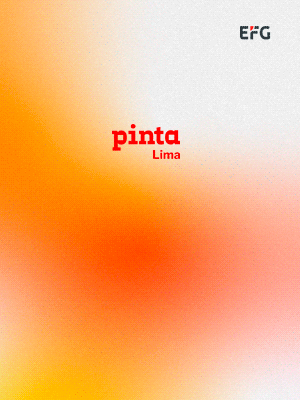EXPERIMENTAL ART PROJECTS IN ARGENTINA
The Museum of Modern Art of Buenos Aires inaugurated El Aprendizaje Infinito (Infinite Learning), an exhibition that recognizes Argentina's master artists and puts in dialogue the historical tradition of arts education and the experimental projects of the latest decades.
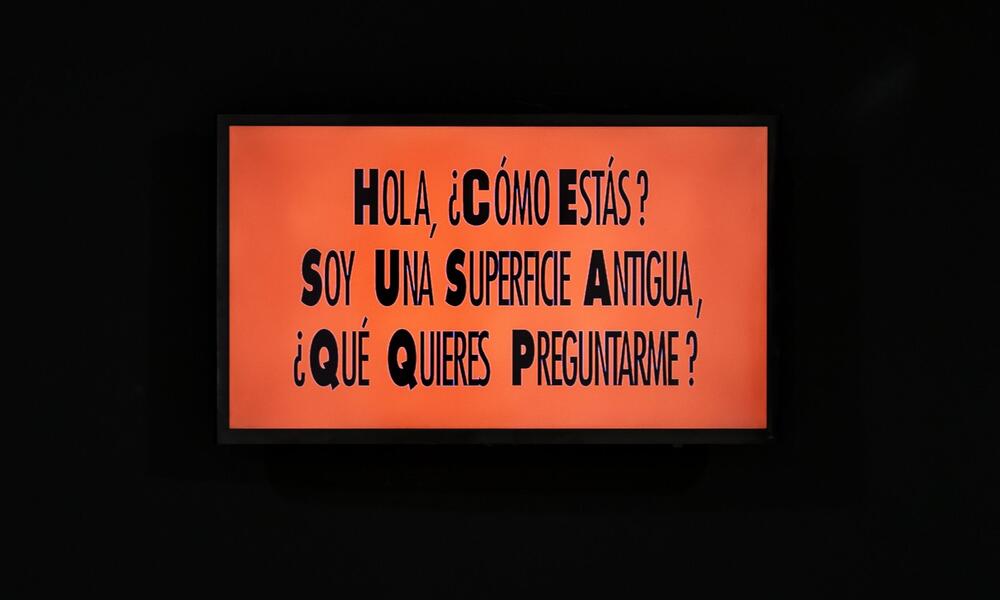
El Aprendizaje Infinito focuses on the experiences developed in Argentina between the 20th and 21st centuries, promoted by artists, educators, pioneer pedagogues and projects for the democratization of knowledge, organized from the institutions and their margins, with the same inclusive, experimental and transforming roots.
Its curator, Jimena Ferreiro, who worked in collaboration with Alfredo Aracil, head of the Moderno's Education Department, explains: "there was a very close work between the Curatorial and Education areas that made this project possible, related to the so-called "pedagogical turn" of the 2000s, which is a way of thinking the production of knowledge within the institutions in a situation of parity: not only do the curators think and the educators execute, but the process is collaborative, reciprocal and supportive. The mission of the educational system is to imagine lives in better conditions. This coincides with the utopian dimension of artistic practice. Art and Education have the same communitarian and equality-based root that bets on social transformation."
-
El aprendizaje infinito (fotos Guido Limardo)
-
El aprendizaje infinito (fotos Guido Limardo)
-
El aprendizaje infinito (fotos Guido Limardo)
-
El aprendizaje infinito (fotos Guido Limardo)
-
El aprendizaje infinito (fotos Guido Limardo)
-
Un museo popular de arte argentino, de Tomás Espina. El aprendizaje infinito (fotos Guido Limardo)
-
Hecho en Buenos Aires. El aprendizaje infinito (fotos Guido Limardo)
The projects and archives on display highlight the ways in which art can contribute to the common good by facilitating people's participation in building deep bonds with each other and with the world.
The exhibition takes place in rooms A and B on the first floor of the museum. Room A revolves around new landscapes for learning. It features works by Diana Aisenberg and Amalia Pica, installations such as the recreation of a popular museum of Argentine art by Tomás Espina, which includes masks with artists' faces, and picnic paintings by Marina De Caro from her series Tierra de las emociones perdidas (Land of Lost Emotions). Room B displays cases that problematize the dissemination and accessibility of specific art contents. It presents a large installation/reading space by Lucas Di Pascuale, the archive of Emilio Pettoruti's Vagón de Arte project and old TV sets that broadcast art programs, such as the mythical El Banquete Telemático by Federico Klemm and Carlos Espartaco, recorded at the Museo Moderno, or Marta Traba's TV interventions. In the same room, models of official and self-managed educational management in contexts of vulnerability are presented, such as the recreation of the artistic curatorial camps, the first mural with the history of Cromoactivismo, and the retrospective of the Liliana Maresca School of Villa Fiorito. Also participating are neighboring projects from the museum's neighborhood with which the Moderno collaborates on a regular basis.
-
La mafia del amor, Tomás Espina. El aprendizaje infinito (fotos Guido Limardo)
-
La mafia del amor, Tomás Espina. El aprendizaje infinito (fotos Guido Limardo)
-
Mural creado en el Bachillerato Popular Trans Mocha Celis. El aprendizaje infinito (fotos Guido Limardo)
-
Obra de Amalia Pica. El aprendizaje infinito (fotos Guido Limardo)
-
Pieza pizarrón, de Claudia del Río. El aprendizaje infinito (fotos Guido Limardo)
-
Revista Ramona. El aprendizaje infinito (fotos Guido Limardo)
Artists: Andrés Aizicovich, Diana Aisenberg, Ernesto Ballesteros, Norah Borges, Olga and Leticia Cossettini, Cromoactivismo (Marina De Caro, Guille Mongan, Vic Musotto and Daiana Rose), Marina De Caro, Claudia del Río, Mirtha Dermisache and the Jornadas del Color y la Forma, Lucas Di Pascuale, Leonel Fernández Pinola, Silvia Gurfein, Graciela Gutiérrez Marx, Federico Jorge Klemm, Guillermo Kuitca, Nicolás Martella y Manuel A. Fernández, Diego Melero, Rosario Vera Peñaloza, Emilio Pettoruti, Amalia Pica, Emilio Renart, Marcela Sinclair, Eduardo Stupía, Marta Traba and Edgardo Antonio Vigo.
Related Topics
May interest you
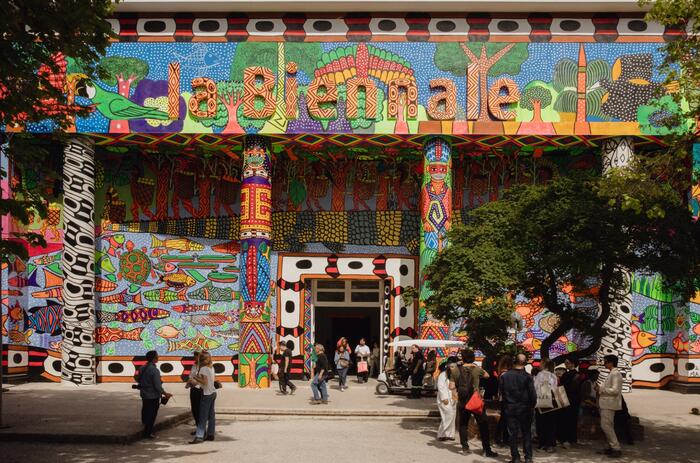
The exhibition of the 60th edition of the Venice Biennale - Stranieri Ovunque (Foregneirs Everywhere) - curated by Brazilian Adriano Pedrosa, presents 331 artists, significantly more than the usual number. More than a third of those artists come from Latin America.
FOREIGNERS EVERYWHERE: LATIN AMERICA TAKES OVER THE VENICE BIENNALE
The exhibition of the 60th edition of the Venice Biennale - Stranieri Ovunque (Foregneirs Everywhere) - curated by Brazilian Adriano Pedrosa, presents 331 artists, significantly more than the usual number. More than a third of those artists come from Latin America.

The exhibition of the 60th edition of the Venice Biennale - Stranieri Ovunque (Foregneirs Everywhere) - curated by Brazilian Adriano Pedrosa, presents 331 artists, significantly more than the usual number. More than a third of those artists come from Latin America.
FOREIGNERS EVERYWHERE: LATIN AMERICA TAKES OVER THE VENICE BIENNALE
The exhibition of the 60th edition of the Venice Biennale - Stranieri Ovunque (Foregneirs Everywhere) - curated by Brazilian Adriano Pedrosa, presents 331 artists, significantly more than the usual number. More than a third of those artists come from Latin America.
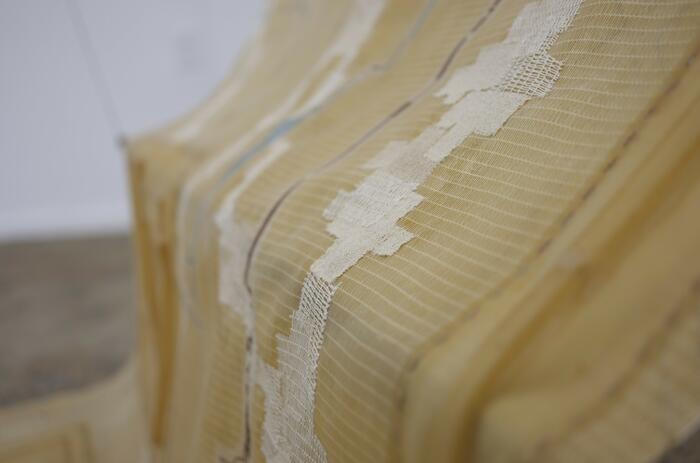
TOMAS REDRADO ART Gallery presented in Miami the fifth movement of MONTES NO VISIBLES (Unseen mountains), curated by Natalia Sosa Molina and Victor López Zumelzu. This new movement features the work of Andrea Ferrero (Peru), Julia Retz (Brazil), and Henry Palacio Clavijo (Colombia).
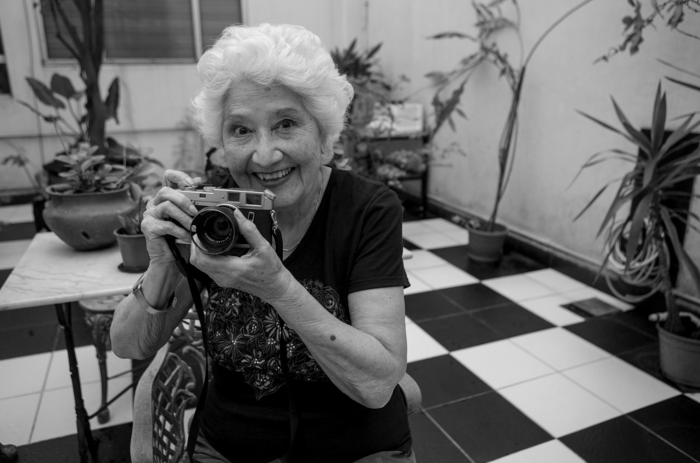
Sara Facio passed away at the age of 92. Photographer, curator, journalist and editor, she stood out for her portraits of Latin American cultural figures and for her sharp and sensitive spirit that vindicated photography in the art world.
FAREWELL TO SARA FACIO, THE GREAT ARGENTINE PHOTOGRAPHER
Sara Facio passed away at the age of 92. Photographer, curator, journalist and editor, she stood out for her portraits of Latin American cultural figures and for her sharp and sensitive spirit that vindicated photography in the art world.
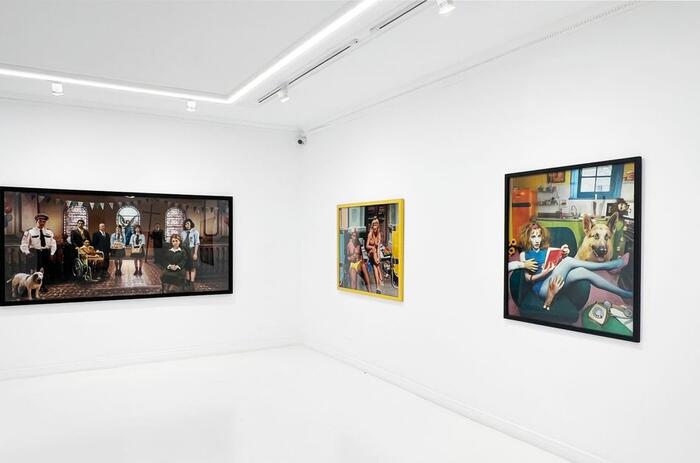
As part of its participation in PhotoEspaña, the Fernando Pradilla Gallery presents the work of Marcos Lopez (Santa Fe, Argentina, 1958), one of the most outstanding Latin American photographers on the scene and a regular on the circuits with his peculiar and characteristic conception of life in South America, where everyday life is combined with exaggeration and color that give him an unmistakable trademark.
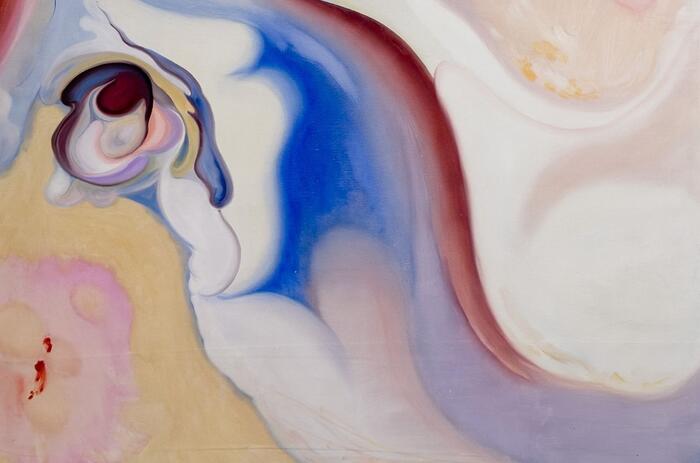
Juana Subercaseaux, a Chilean artist based in Mexico City, presents Esto es Eso, her first exhibition at OMR, showcasing her latest works that intertwine a feminine perspective with the intimate, the mystical, the ephemeral, and the spiritual aspects of nature.
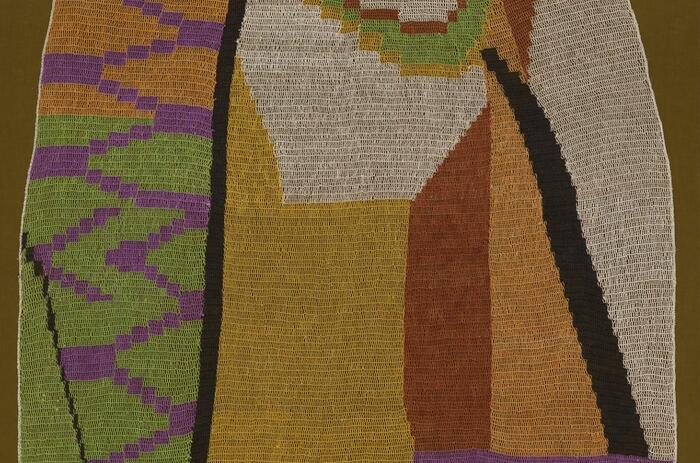
For the 60th International Exhibition of la Biennale di Venezia Stranieri Ovunque (Foregneirs Everywhere), artist Claudia Alarcón and art-collective Silät are presenting their reflections on being treated as foreigners in their own country.
CLAUDIA ALARCÓN AND SILÄT’S VENICE BIENNALE PARTICIPATION
For the 60th International Exhibition of la Biennale di Venezia Stranieri Ovunque (Foregneirs Everywhere), artist Claudia Alarcón and art-collective Silät are presenting their reflections on being treated as foreigners in their own country.
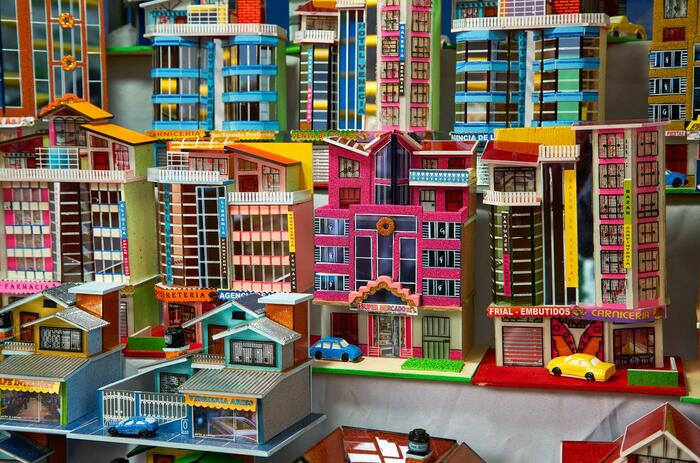
Ch'ixifuturismo is the exhibition at Fundación Larivière that presents photographs by Florencia Blanco on Freddy Mamani Silvestri's architecture, in dialogue with works by Narda Alvarado, Tin Ayala, Iván Cáceres, Cristina Collazos, Miguel Hilari and Claudia Joskowicz, and curated by Santiago García Navarro. The exhibition includes 40 photos, a series of drawings, three videos and a film.
FLORENCIA BLANCO ON THE ARCHITECTURE OF FREDDY MAMANI SILVESTRI
Ch'ixifuturismo is the exhibition at Fundación Larivière that presents photographs by Florencia Blanco on Freddy Mamani Silvestri's architecture, in dialogue with works by Narda Alvarado, Tin Ayala, Iván Cáceres, Cristina Collazos, Miguel Hilari and Claudia Joskowicz, and curated by Santiago García Navarro. The exhibition includes 40 photos, a series of drawings, three videos and a film.

The exhibition of the 60th edition of the Venice Biennale - Stranieri Ovunque (Foregneirs Everywhere) - curated by Brazilian Adriano Pedrosa, presents 331 artists, significantly more than the usual number. More than a third of those artists come from Latin America.
FOREIGNERS EVERYWHERE: LATIN AMERICA TAKES OVER THE VENICE BIENNALE
The exhibition of the 60th edition of the Venice Biennale - Stranieri Ovunque (Foregneirs Everywhere) - curated by Brazilian Adriano Pedrosa, presents 331 artists, significantly more than the usual number. More than a third of those artists come from Latin America.

TOMAS REDRADO ART Gallery presented in Miami the fifth movement of MONTES NO VISIBLES (Unseen mountains), curated by Natalia Sosa Molina and Victor López Zumelzu. This new movement features the work of Andrea Ferrero (Peru), Julia Retz (Brazil), and Henry Palacio Clavijo (Colombia).

Sara Facio passed away at the age of 92. Photographer, curator, journalist and editor, she stood out for her portraits of Latin American cultural figures and for her sharp and sensitive spirit that vindicated photography in the art world.
FAREWELL TO SARA FACIO, THE GREAT ARGENTINE PHOTOGRAPHER
Sara Facio passed away at the age of 92. Photographer, curator, journalist and editor, she stood out for her portraits of Latin American cultural figures and for her sharp and sensitive spirit that vindicated photography in the art world.

As part of its participation in PhotoEspaña, the Fernando Pradilla Gallery presents the work of Marcos Lopez (Santa Fe, Argentina, 1958), one of the most outstanding Latin American photographers on the scene and a regular on the circuits with his peculiar and characteristic conception of life in South America, where everyday life is combined with exaggeration and color that give him an unmistakable trademark.

Juana Subercaseaux, a Chilean artist based in Mexico City, presents Esto es Eso, her first exhibition at OMR, showcasing her latest works that intertwine a feminine perspective with the intimate, the mystical, the ephemeral, and the spiritual aspects of nature.

For the 60th International Exhibition of la Biennale di Venezia Stranieri Ovunque (Foregneirs Everywhere), artist Claudia Alarcón and art-collective Silät are presenting their reflections on being treated as foreigners in their own country.
CLAUDIA ALARCÓN AND SILÄT’S VENICE BIENNALE PARTICIPATION
For the 60th International Exhibition of la Biennale di Venezia Stranieri Ovunque (Foregneirs Everywhere), artist Claudia Alarcón and art-collective Silät are presenting their reflections on being treated as foreigners in their own country.

Ch'ixifuturismo is the exhibition at Fundación Larivière that presents photographs by Florencia Blanco on Freddy Mamani Silvestri's architecture, in dialogue with works by Narda Alvarado, Tin Ayala, Iván Cáceres, Cristina Collazos, Miguel Hilari and Claudia Joskowicz, and curated by Santiago García Navarro. The exhibition includes 40 photos, a series of drawings, three videos and a film.
FLORENCIA BLANCO ON THE ARCHITECTURE OF FREDDY MAMANI SILVESTRI
Ch'ixifuturismo is the exhibition at Fundación Larivière that presents photographs by Florencia Blanco on Freddy Mamani Silvestri's architecture, in dialogue with works by Narda Alvarado, Tin Ayala, Iván Cáceres, Cristina Collazos, Miguel Hilari and Claudia Joskowicz, and curated by Santiago García Navarro. The exhibition includes 40 photos, a series of drawings, three videos and a film.

The exhibition of the 60th edition of the Venice Biennale - Stranieri Ovunque (Foregneirs Everywhere) - curated by Brazilian Adriano Pedrosa, presents 331 artists, significantly more than the usual number. More than a third of those artists come from Latin America.
FOREIGNERS EVERYWHERE: LATIN AMERICA TAKES OVER THE VENICE BIENNALE
The exhibition of the 60th edition of the Venice Biennale - Stranieri Ovunque (Foregneirs Everywhere) - curated by Brazilian Adriano Pedrosa, presents 331 artists, significantly more than the usual number. More than a third of those artists come from Latin America.

TOMAS REDRADO ART Gallery presented in Miami the fifth movement of MONTES NO VISIBLES (Unseen mountains), curated by Natalia Sosa Molina and Victor López Zumelzu. This new movement features the work of Andrea Ferrero (Peru), Julia Retz (Brazil), and Henry Palacio Clavijo (Colombia).

Sara Facio passed away at the age of 92. Photographer, curator, journalist and editor, she stood out for her portraits of Latin American cultural figures and for her sharp and sensitive spirit that vindicated photography in the art world.
FAREWELL TO SARA FACIO, THE GREAT ARGENTINE PHOTOGRAPHER
Sara Facio passed away at the age of 92. Photographer, curator, journalist and editor, she stood out for her portraits of Latin American cultural figures and for her sharp and sensitive spirit that vindicated photography in the art world.

As part of its participation in PhotoEspaña, the Fernando Pradilla Gallery presents the work of Marcos Lopez (Santa Fe, Argentina, 1958), one of the most outstanding Latin American photographers on the scene and a regular on the circuits with his peculiar and characteristic conception of life in South America, where everyday life is combined with exaggeration and color that give him an unmistakable trademark.

Juana Subercaseaux, a Chilean artist based in Mexico City, presents Esto es Eso, her first exhibition at OMR, showcasing her latest works that intertwine a feminine perspective with the intimate, the mystical, the ephemeral, and the spiritual aspects of nature.

For the 60th International Exhibition of la Biennale di Venezia Stranieri Ovunque (Foregneirs Everywhere), artist Claudia Alarcón and art-collective Silät are presenting their reflections on being treated as foreigners in their own country.
CLAUDIA ALARCÓN AND SILÄT’S VENICE BIENNALE PARTICIPATION
For the 60th International Exhibition of la Biennale di Venezia Stranieri Ovunque (Foregneirs Everywhere), artist Claudia Alarcón and art-collective Silät are presenting their reflections on being treated as foreigners in their own country.

Ch'ixifuturismo is the exhibition at Fundación Larivière that presents photographs by Florencia Blanco on Freddy Mamani Silvestri's architecture, in dialogue with works by Narda Alvarado, Tin Ayala, Iván Cáceres, Cristina Collazos, Miguel Hilari and Claudia Joskowicz, and curated by Santiago García Navarro. The exhibition includes 40 photos, a series of drawings, three videos and a film.
FLORENCIA BLANCO ON THE ARCHITECTURE OF FREDDY MAMANI SILVESTRI
Ch'ixifuturismo is the exhibition at Fundación Larivière that presents photographs by Florencia Blanco on Freddy Mamani Silvestri's architecture, in dialogue with works by Narda Alvarado, Tin Ayala, Iván Cáceres, Cristina Collazos, Miguel Hilari and Claudia Joskowicz, and curated by Santiago García Navarro. The exhibition includes 40 photos, a series of drawings, three videos and a film.

The exhibition of the 60th edition of the Venice Biennale - Stranieri Ovunque (Foregneirs Everywhere) - curated by Brazilian Adriano Pedrosa, presents 331 artists, significantly more than the usual number. More than a third of those artists come from Latin America.
FOREIGNERS EVERYWHERE: LATIN AMERICA TAKES OVER THE VENICE BIENNALE
The exhibition of the 60th edition of the Venice Biennale - Stranieri Ovunque (Foregneirs Everywhere) - curated by Brazilian Adriano Pedrosa, presents 331 artists, significantly more than the usual number. More than a third of those artists come from Latin America.

TOMAS REDRADO ART Gallery presented in Miami the fifth movement of MONTES NO VISIBLES (Unseen mountains), curated by Natalia Sosa Molina and Victor López Zumelzu. This new movement features the work of Andrea Ferrero (Peru), Julia Retz (Brazil), and Henry Palacio Clavijo (Colombia).

Sara Facio passed away at the age of 92. Photographer, curator, journalist and editor, she stood out for her portraits of Latin American cultural figures and for her sharp and sensitive spirit that vindicated photography in the art world.
FAREWELL TO SARA FACIO, THE GREAT ARGENTINE PHOTOGRAPHER
Sara Facio passed away at the age of 92. Photographer, curator, journalist and editor, she stood out for her portraits of Latin American cultural figures and for her sharp and sensitive spirit that vindicated photography in the art world.

As part of its participation in PhotoEspaña, the Fernando Pradilla Gallery presents the work of Marcos Lopez (Santa Fe, Argentina, 1958), one of the most outstanding Latin American photographers on the scene and a regular on the circuits with his peculiar and characteristic conception of life in South America, where everyday life is combined with exaggeration and color that give him an unmistakable trademark.

Juana Subercaseaux, a Chilean artist based in Mexico City, presents Esto es Eso, her first exhibition at OMR, showcasing her latest works that intertwine a feminine perspective with the intimate, the mystical, the ephemeral, and the spiritual aspects of nature.

For the 60th International Exhibition of la Biennale di Venezia Stranieri Ovunque (Foregneirs Everywhere), artist Claudia Alarcón and art-collective Silät are presenting their reflections on being treated as foreigners in their own country.
CLAUDIA ALARCÓN AND SILÄT’S VENICE BIENNALE PARTICIPATION
For the 60th International Exhibition of la Biennale di Venezia Stranieri Ovunque (Foregneirs Everywhere), artist Claudia Alarcón and art-collective Silät are presenting their reflections on being treated as foreigners in their own country.

Ch'ixifuturismo is the exhibition at Fundación Larivière that presents photographs by Florencia Blanco on Freddy Mamani Silvestri's architecture, in dialogue with works by Narda Alvarado, Tin Ayala, Iván Cáceres, Cristina Collazos, Miguel Hilari and Claudia Joskowicz, and curated by Santiago García Navarro. The exhibition includes 40 photos, a series of drawings, three videos and a film.
FLORENCIA BLANCO ON THE ARCHITECTURE OF FREDDY MAMANI SILVESTRI
Ch'ixifuturismo is the exhibition at Fundación Larivière that presents photographs by Florencia Blanco on Freddy Mamani Silvestri's architecture, in dialogue with works by Narda Alvarado, Tin Ayala, Iván Cáceres, Cristina Collazos, Miguel Hilari and Claudia Joskowicz, and curated by Santiago García Navarro. The exhibition includes 40 photos, a series of drawings, three videos and a film.

The exhibition of the 60th edition of the Venice Biennale - Stranieri Ovunque (Foregneirs Everywhere) - curated by Brazilian Adriano Pedrosa, presents 331 artists, significantly more than the usual number. More than a third of those artists come from Latin America.
FOREIGNERS EVERYWHERE: LATIN AMERICA TAKES OVER THE VENICE BIENNALE
The exhibition of the 60th edition of the Venice Biennale - Stranieri Ovunque (Foregneirs Everywhere) - curated by Brazilian Adriano Pedrosa, presents 331 artists, significantly more than the usual number. More than a third of those artists come from Latin America.

TOMAS REDRADO ART Gallery presented in Miami the fifth movement of MONTES NO VISIBLES (Unseen mountains), curated by Natalia Sosa Molina and Victor López Zumelzu. This new movement features the work of Andrea Ferrero (Peru), Julia Retz (Brazil), and Henry Palacio Clavijo (Colombia).

Sara Facio passed away at the age of 92. Photographer, curator, journalist and editor, she stood out for her portraits of Latin American cultural figures and for her sharp and sensitive spirit that vindicated photography in the art world.
FAREWELL TO SARA FACIO, THE GREAT ARGENTINE PHOTOGRAPHER
Sara Facio passed away at the age of 92. Photographer, curator, journalist and editor, she stood out for her portraits of Latin American cultural figures and for her sharp and sensitive spirit that vindicated photography in the art world.

As part of its participation in PhotoEspaña, the Fernando Pradilla Gallery presents the work of Marcos Lopez (Santa Fe, Argentina, 1958), one of the most outstanding Latin American photographers on the scene and a regular on the circuits with his peculiar and characteristic conception of life in South America, where everyday life is combined with exaggeration and color that give him an unmistakable trademark.

Juana Subercaseaux, a Chilean artist based in Mexico City, presents Esto es Eso, her first exhibition at OMR, showcasing her latest works that intertwine a feminine perspective with the intimate, the mystical, the ephemeral, and the spiritual aspects of nature.

For the 60th International Exhibition of la Biennale di Venezia Stranieri Ovunque (Foregneirs Everywhere), artist Claudia Alarcón and art-collective Silät are presenting their reflections on being treated as foreigners in their own country.
CLAUDIA ALARCÓN AND SILÄT’S VENICE BIENNALE PARTICIPATION
For the 60th International Exhibition of la Biennale di Venezia Stranieri Ovunque (Foregneirs Everywhere), artist Claudia Alarcón and art-collective Silät are presenting their reflections on being treated as foreigners in their own country.

Ch'ixifuturismo is the exhibition at Fundación Larivière that presents photographs by Florencia Blanco on Freddy Mamani Silvestri's architecture, in dialogue with works by Narda Alvarado, Tin Ayala, Iván Cáceres, Cristina Collazos, Miguel Hilari and Claudia Joskowicz, and curated by Santiago García Navarro. The exhibition includes 40 photos, a series of drawings, three videos and a film.
FLORENCIA BLANCO ON THE ARCHITECTURE OF FREDDY MAMANI SILVESTRI
Ch'ixifuturismo is the exhibition at Fundación Larivière that presents photographs by Florencia Blanco on Freddy Mamani Silvestri's architecture, in dialogue with works by Narda Alvarado, Tin Ayala, Iván Cáceres, Cristina Collazos, Miguel Hilari and Claudia Joskowicz, and curated by Santiago García Navarro. The exhibition includes 40 photos, a series of drawings, three videos and a film.

